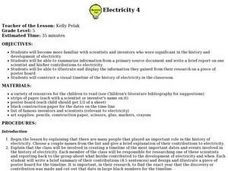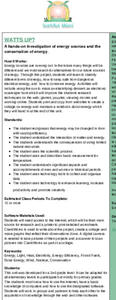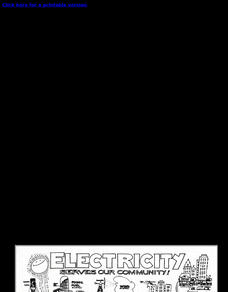Curated OER
Using Transistors: Let's Get Transistorized!
Learners build two circuits and explore how transistors function. This activity allow them to observe the operation of a transistor as an amplifier.
Curated OER
Electricity Lesson Plan
Students conduct experiments on static electricity using the Internet. They compose a 30 second electricity safety jingle to be aired on a local radio station.
Curated OER
Analytical Spectroscope
Students using a spectroscope view different substances when heated with electricity.
Curated OER
Dimmer and Dimmer and Dimmer and Dimmer
Eighth graders model rheostats to see how they work.
Curated OER
Aurora Borealis
Young scholars discuss what causes the northern lights and the folklore attached to them. They discuss magnetic fields, and use various common materials to discover if ions conduct electricity.
Curated OER
Electricity 4
Fifth graders create a timeline of the most important dates and events involved in the history of electricity. Each student researches one scientist and designs and illustrates a piece of a poster board for the timeline.
Curated OER
Circuits and Conductors
Students participate in an online lesson to explain the conductivity of different materials and the effect of changing the power source.
Curated OER
Electricity - Lesson Plan
Tenth graders should explain some basic properties of electricity and know how electricity is produced. They should also explain the electrical components that make up electric circuits.
Curated OER
Unplugged!
Students consider several things: the importance of electricity and energy in their lives, the costs of that energy, and the importance of conserving energy.
Curated OER
WATTS UP?
Second graders research the Internet as they classify different forms of energy, investigate electrical energy and how to conserve energy.
Curated OER
Electricity Serves Us
Second graders identify sources of energy that produce electricity and serves our community.
Curated OER
Using "Student Power" to Generate Electricity to Run a Portable Compact Disc Player
Students conclude that magnets and magnetic fields can produce electricity. Students also understand how a small motor works and how gears work. Students describe how energy can transform along a pathway.
Concord Consortium
Concord Consortium: Stem Resources: Wind Generator
Using a voltage sensor, students will measure how much "electricity" is produced by the wind turbine that they design and build. Students will experiment with blade designs to see which one collects energy from the wind the most...
National Academies of Sciences, Engineering, and Medicine
The National Academies: Our Energy Sources
The many sources of energy production in the United States are described in this overview. Included are traditional sources, renewable sources, and new energy production technologies.
Library of Congress
Loc: Learning Page: Thomas Edison
This resource provides lesson plans and information about Thomas Edison and his inventions.
Georgia State University
Georgia State University: Hyper Physics: Electricity and Magnetism
HyperPhysics is an exploration environment for concepts in physics by Georgia State University which employs concept maps and other linking strategies to facilitate smooth navigation. This section focuses on electricity and magnetism.
American Geosciences Institute
American Geosciences Institute: Energy
Seven hands-on lessons module where students learn about energy. These inquiry-based explorations investigate where energy resources come from and how they are converted into electricity, how fossil fuels form, the importance of...
Massachusetts Institute of Technology
Mit: Open Course Ware: Courses: Physics Ii: Electricity and Magnetism
College-level physics course highlighting electricity and magnetism. This course is divided into several modules including electric fields, magnetic fields, electromagnetic forces, conductors and dielectrics, electromagnetic waves, and...
University of Colorado
University of Colorado: Ph Et Interactive Simulations: Circuit Construction Kit
Build circuits with resistors, light bulbs, batteries, and switches. Take measurements with the realistic ammeter and voltmeter. View the circuit as a schematic diagram, or switch to a life-like view.
University of Colorado
University of Colorado: Ph Et Interactive Simulations: Band Structure
Explore the origin of energy bands in crystals of atoms. The structure of these bands determines how materials conduct electricity. Java required.
University of Colorado
University of Colorado: Ph Et Interactive Simulations: Electric Hockey
Play hockey with electric charges. Place charges on the ice, then hit start to try to get the puck in the goal. View the electric field. Trace the puck's motion. Make the game harder by placing walls in front of the goal. This is a clone...
University of Colorado
University of Colorado: Ph Et Interactive Simulations: Electric Field of Dreams
Play ball! Add charges to the Field of Dreams and see how they react to the electric field. Turn on a background electric field and adjust the direction and magnitude. (Kevin Costner not included). Java required.
PBS
Pbs Kids: Design Squad Challenge: Dance Pad Mania (Pdf) [Pdf]
Hands-on challenge to build a dance pad that lets you use your feet to either flash a light or to sound a buzzer. Provides full list of materials with ideas on how to design, build, test, and redesign the pad if necessary. Activity...
Science Buddies
Science Buddies: Solar Cell Power Output vs. Temperature
Solar cells provide a clean way of making electricity directly from sunlight. In this project you will build a simple circuit and experimental setup to investigate whether the power output of a solar cell changes with ambient temperature.
























![Pbs Kids: Design Squad Challenge: Dance Pad Mania (Pdf) [Pdf] Handout Pbs Kids: Design Squad Challenge: Dance Pad Mania (Pdf) [Pdf] Handout](https://content.lessonplanet.com/knovation/original/39874-4adfadd8b52b66e71cac53cd55883d55.jpg?1661243850)
